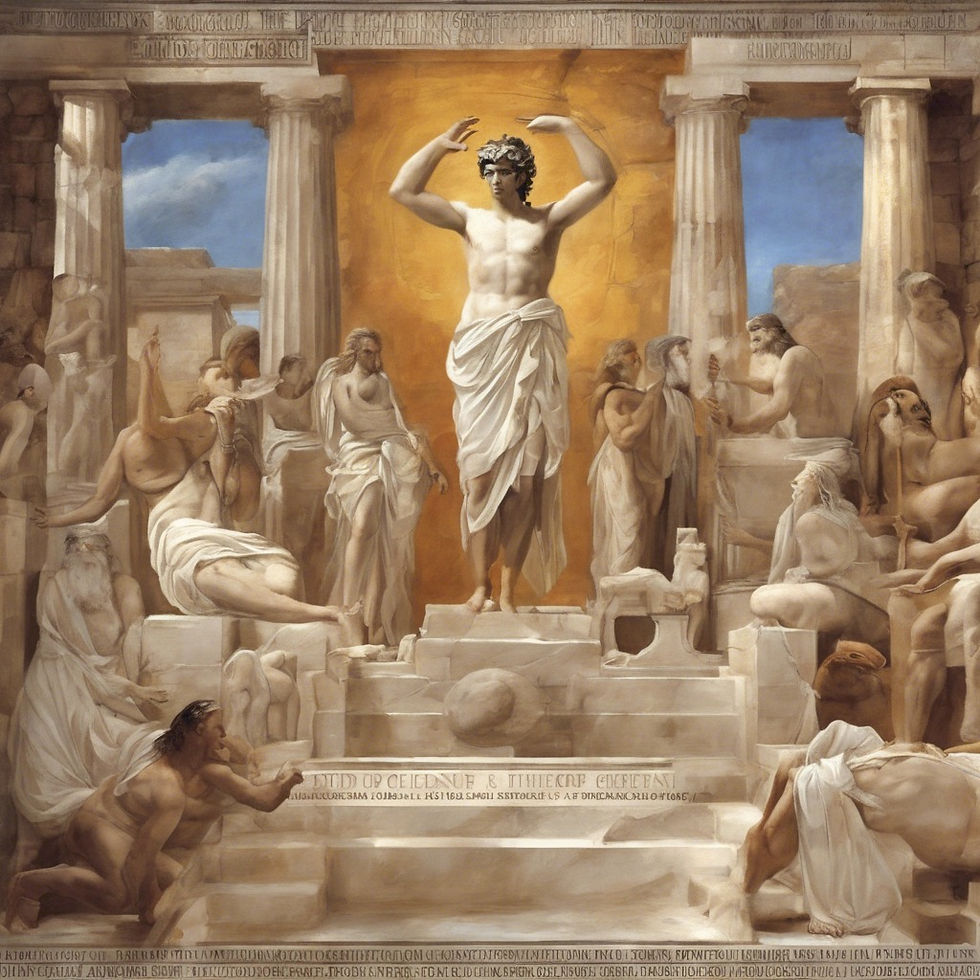"The Sophoclean Approach to Physical Wellness: Lessons from Ancient Greece"
- Mahnoor Khakwani
- Apr 8, 2024
- 6 min read

In today's fast-paced world, where health and wellness are paramount, ancient wisdom can offer invaluable insights. One such wellspring of wisdom is found in the works of Sophocles, the renowned Greek playwright. While Sophocles is often celebrated for his timeless tragedies, his insights into physical wellness are equally profound. By examining his works, we can uncover a holistic approach to physical well-being that remains relevant even in the modern age.
The concept of moderation was central to Sophocles' philosophy. In his tragedies, characters often face disastrous consequences when they succumb to extremes – whether it be excessive pride, ambition, or passion. Similarly, in matters of physical health, moderation is key. Whether it's exercise, diet, or rest, finding a balance that suits individual needs is essential for long-term well-being.
Moderation and balance, as elucidated by the wisdom of Sophocles and ancient Greek culture, are fundamental pillars in the pursuit of physical wellness. Drawing insights from this approach, we can discern valuable lessons for contemporary living.
The Greeks valued a balanced diet consisting of fresh fruits, vegetables, grains, and lean proteins. They understood the importance of moderation in consumption, avoiding excesses that could lead to health imbalances. By embracing a diet rich in nutrients while indulging in moderation, individuals can maintain vitality and well-being.
Physical activity was integral to Greek culture, with athletic competitions held in high esteem. However, moderation prevailed even in exercise, as excessive strain could lead to injury or exhaustion. By incorporating a mix of cardiovascular, strength, and flexibility exercises into a balanced routine, individuals can cultivate endurance and strength without risking harm.
The Greeks recognized the rejuvenating power of rest and relaxation. They valued adequate sleep and leisure time as essential components of physical wellness. By prioritizing restorative rest and allowing the body time to recuperate, individuals can enhance recovery, boost immunity, and promote overall health.
Sophocles' tragedies often explored the complexities of human emotion, emphasizing the importance of emotional balance. Greeks believed in the interconnectedness of mind and body, understanding that emotional well-being profoundly influences physical health. By fostering emotional resilience, managing stress, and seeking support when needed, individuals can cultivate inner harmony and promote holistic wellness.
Greek culture celebrated the enjoyment of life's pleasures, from feasting to social gatherings. However, they also cautioned against excess, recognizing the potential pitfalls of overindulgence. By savoring life's delights in moderation and maintaining self-awareness, individuals can derive joy without compromising their health and well-being.
The Sophoclean approach to physical wellness emphasizes moderation and balance in all aspects of life. By embracing these principles—whether in diet, exercise, rest, emotional well-being, or the pursuit of pleasure—individuals can nurture a holistic sense of health and vitality that resonates across the ages.
Sophocles recognized the interconnectedness of the mind and body long before it became a mainstream concept. In his plays, psychological turmoil often manifests physically, with characters experiencing ailments and symptoms reflective of their inner struggles. This underscores the importance of addressing mental health alongside physical health. Practices such as mindfulness, meditation, and therapy can complement traditional approaches to wellness, fostering a harmonious relationship between mind and body.
The Sophoclean approach to physical wellness, rooted in the wisdom of ancient Greece, acknowledges the profound interconnection between the mind and body. This holistic perspective views health not as separate domains but as an integrated system where mental and physical well-being mutually influence each other. Here's how the Sophoclean approach defines the mind-body connection.
In Sophoclean tragedies, characters often exhibit physical symptoms that mirror their psychological turmoil. For instance,
stress
grief,
or guilt may manifest.
Physical ailments such as
headaches,
fatigue,
or digestive issues.
This portrayal underscores the idea that mental and emotional states can profoundly impact physical health.
Ancient Greeks believed in treating the whole person rather than isolated symptoms. Healing modalities such as music therapy, herbal medicine, and rituals were employed to address both physical and psychological aspects of illness. These practices recognized the intimate relationship between mind and body, seeking to restore balance and harmony within the individual.
Stoicism, a school of thought prominent in ancient Greece, emphasized the importance of mastering one's emotions and perceptions. Stoic philosophers like Epictetus and Marcus Aurelius taught that mental resilience and equanimity were essential for achieving physical health and overall well-being. By cultivating inner peace and acceptance, individuals could mitigate stress-related illnesses and promote longevity.
The practice of mindfulness, although not explicitly mentioned in Sophoclean works, aligns with the Greek concept of self-awareness and introspection. Mindfulness techniques, including meditation and breathwork, foster a deeper connection between mind and body, promoting relaxation, stress reduction, and emotional balance. These practices encourage individuals to tune into bodily sensations, thoughts, and emotions, fostering a holistic understanding of their well-being.
In ancient Greece, physical exercise was not merely about building strength and endurance but also about cultivating mental discipline and focus. Athletes engaged in rigorous training regimens that demanded concentration, perseverance, and self-control. This disciplined approach to physical activity underscored the inseparable link between mental fortitude and physical performance.
In essence, the Sophoclean approach to physical wellness recognizes that the mind and body are intricately connected, with each exerting profound influence on the other.
By honouring this interconnectedness and adopting practices that promote mental and emotional well-being alongside physical health, individuals can achieve a harmonious integration of mind, body, and spirit.
The characters in Sophocles' tragedies endure immense suffering and hardship, yet they exhibit remarkable resilience in the face of adversity. This resilience can serve as inspiration for navigating life's challenges, including those related to physical health. Whether recovering from injury, managing chronic illness, or facing setbacks in fitness goals, cultivating resilience enables individuals to persevere and thrive despite obstacles.
The Sophoclean approach to physical wellness, drawing from the lessons of ancient Greece, defines resilience in adversity as the ability to endure, adapt, and thrive in the face of challenges.
This concept is exemplified in the tragedies of Sophocles and the stoic philosophy embraced by ancient Greek culture. Here's how the Sophoclean approach defines resilience in adversity:
Sophocles' plays often depict characters facing unimaginable hardships and suffering, yet they demonstrate remarkable endurance in the face of adversity. Whether confronted with loss, betrayal, or fate, these characters exhibit resilience by persevering through their trials without succumbing to despair. This resilience underscores the human capacity to endure suffering and emerge stronger on the other side.
Central to the concept of resilience in ancient Greek philosophy is the acceptance of fate or "stoic acceptance." Stoicism teaches that while individuals cannot always control external circumstances, they can control their responses to them. By accepting the inevitability of adversity and embracing hardships as opportunities for growth, individuals can cultivate resilience and maintain inner peace amid life's challenges.
Resilience in adversity also involves the ability to adapt and pivot in response to changing circumstances. In Sophoclean tragedies, characters often face unexpected twists of fate that require them to improvise and adjust their plans. Similarly, in the realm of physical wellness, individuals must adapt their fitness routines, dietary habits, and self-care practices to navigate injuries, illnesses, or setbacks effectively.
Ancient Greek culture placed great emphasis on moral integrity and ethical conduct as markers of resilience. Characters in Sophoclean dramas demonstrate resilience not only through physical endurance but also through their unwavering commitment to moral principles and values. This moral fortitude enables individuals to withstand temptation, overcome adversity, and maintain a sense of integrity even in the face of adversity.
Despite the emphasis on individual resilience, ancient Greeks also valued communal support and solidarity in times of crisis. Characters in Sophoclean tragedies often seek counsel from trusted allies, family members, or mentors, recognizing the importance of community in overcoming adversity. Similarly, in the pursuit of physical wellness, seeking support from friends, family, or healthcare professionals can bolster resilience and facilitate recovery.
The Sophoclean approach to physical wellness defines resilience in adversity as the capacity to endure suffering with grace, accept fate stoically, adapt to changing circumstances, uphold moral principles, and seek support from others. By embodying these qualities, individuals can cultivate resilience that transcends physical challenges, enabling them to navigate life's trials with courage, dignity, and strength.
Ancient Greeks revered nature as a source of vitality and healing. Sophocles often incorporated natural imagery and symbolism into his works, highlighting the profound connection between humanity and the natural world. In today's urbanized society, reconnecting with nature – whether through outdoor activities, eco-therapy, or simply spending time in green spaces – can rejuvenate the body and soul, promoting overall well-being.
Greek society placed great emphasis on communal values and mutual support. In Sophocles' plays, characters rely on friends, family, and community for emotional sustenance during times of crisis. Similarly, fostering strong social connections and support networks is crucial for maintaining physical wellness. Whether through group exercise classes, sports teams, or support groups, belonging to a community can provide encouragement, accountability, and camaraderie on the journey to better health.
The Sophoclean approach to physical wellness offers a timeless blueprint for modern living. By embracing moderation, nurturing the mind-body connection, cultivating resilience, reconnecting with nature, and fostering community support, individuals can embark on a path to holistic well-being that honors the wisdom of the ancients. As we navigate the complexities of modern life, let us draw inspiration from the enduring insights of Sophocles and strive to achieve balance, vitality, and fulfillment in both body and soul.
"He who has health has hope and he who has hope has everything.”







Comments